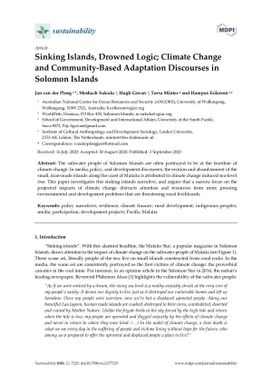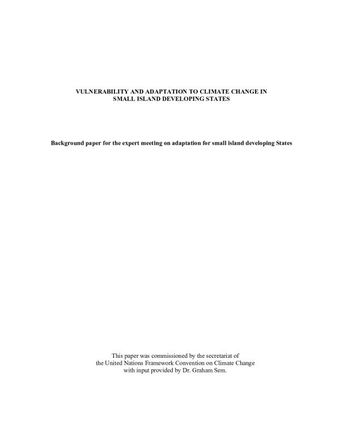Sinking Islands, drowned logic; Climate change and community-based adaptation discourses in Solomon Islands
- Description:
- The saltwater people of Solomon Islands are often portrayed to be at the front line of climate change. In media, policy and development discourses the erosion and abandonment of the small , man made islands along the coast if Malaita is attributed to climate change induced sea-level rise. The paper investigates this sinking islands narratives and and argues that a narrow focus on the projected impacts of climate change distracts attention and resources from more pressing environmental and development problems that are threatening rural livelihoods.
- Display date:
- 2020
- Collections:
- Secretariat of the Pacific Regional Environment Programme (SPREP)
- Publisher:
- The Government of Solomon Islands
- Content partner:
- Secretariat of the Pacific Regional Environment Programme (SPREP)
- Availability:
- Not specified
-
Copyright status: All rights reservedFind out more about what you are able to do with this itemThis item is all rights reserved, with means you'll have to get permission from Secretariat of the Pacific Regional Environment Programme (SPREP) before using it. For more information, please see our use and reuse page.What can I do with this item?Non-infringing useNZ copyright law does not prevent every use of a copyright work, and this item may be hosted by an international institute or organisation. You should consider what you can and cannot do with a copyright work.No sharingYou may not copy and/or share this item with others without further permission. This includes posting it on your blog, using it in a presentation, or any other public use.No modifyingYou are not allowed to adapt or remix this item into any other works.No commercial useYou may not use this item commercially.
Related items
Welcome and warm Pasifik greetings
The information on this site has been gathered from our content partners.
The names, terms, and labels that we present on the site may contain images or voices of deceased persons and may also reflect the bias, norms, and perspective of the period of time in which they were created. We accept that these may not be appropriate today.
If you have any concerns or questions about an item, please contact us.


